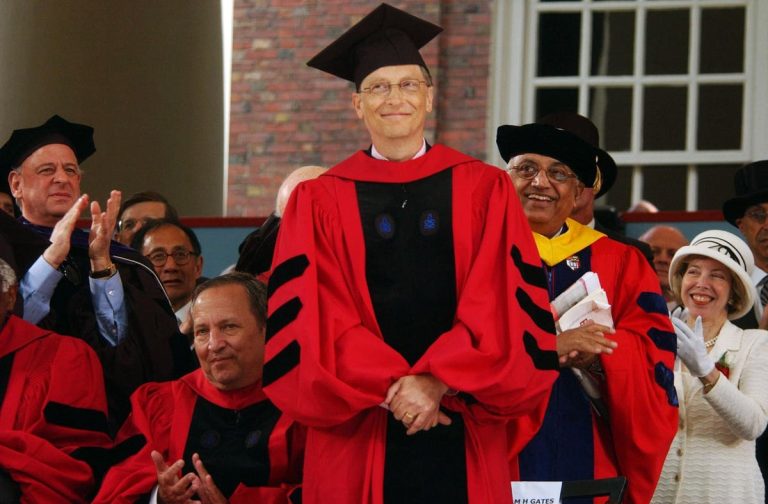The senior members of the newly formed House Select Committee on the Chinese Communist Party (CCP) introduced legislation last week that will force college endowments and foundations to divest from China. It is the latest in a series of pronouncements from Washington this summer that targets investor capital going to Chinese companies.
The bill, called the Dump Investments in Troublesome Communist Holdings Act (aka the DITCH Act), prohibits university endowments, public pension plans, and any other tax-exempt entity from investing in Chinese companies. If they choose to do so, they lose their tax-exempt status.
“American taxpayers should not be forced to subsidize investments that benefit the Chinese Communist Party,” the Committee Chairman, Michael Gallagher (R-Wisc.), said in a statement published Aug. 1. “Universities, non-profits, public pension funds, and other institutions that want preferential tax treatment must choose: are they committed to their professed values or to financing a genocidal communist regime?”
Gallagher and Senator Josh Hawley (R-MO) introduced the DITCH Act last year, but there is growing momentum in their favor on Capitol Hill. No Democrats have signed onto this bill at this time.
I contacted Harvard Management Company, the asset manager that lords over thousands of global funds in Harvard University’s roughly $53 billion endowment, to comment on how they would manage this if it became law. They did not respond. Princeton University also did not respond to requests, nor did the Gates Foundation.
The bill does not ban foundation grants to China, nor would it deny China grants to universities. But it would ban foundations from owning China stocks and bonds.
“Tax-exempt organizations are designed to promote the public good or provide a charitable service,” said Committee member Rep. Darin Lahood (R-Ill). “They have an obligation to protect the United States and our values.”
CalPERS, the California Public Employees’ Retirement System, currently has around $465 billion in assets under management. Like Harvard, they invest in hundreds of mutual funds. Unless a company is banned nationwide, and not just for particular entities like CalPERS, then they would have to rely on the third-party fund manager to remove a particular China security of their own volition for all mutual fund holders, or create a private fund for CalPERS, which is also doable.
CalPERS said it has $7.9 billion of California public employee pension money invested in China.
Some Chinese stocks are banned for all of us already. These include dozens of defense industry-related companies. The DITCH Act additionally bans public pension funds and endowments from owning China securities unless granted a waiver by Treasury, and the reason given for the waiver is made public.
CalPERS’ Office of Public Affairs said they had not yet seen the bill as of Aug. 4, but would comply with the law if forced to sell funds holding China.
Some on Capitol Hill believe the U.S. is funding America’s biggest rival.
Last month, the House Select Committee went after four venture capital firms — GGV Capital, GSR Ventures, Qualcomm Ventures, and Walden International — for their investments in China tech start-ups. Separate letters were sent to the four firms on July 18, marking the first time venture capitalists were in DCs crosshairs when it comes to China policy.
This time, Ranking Member Raja Kristhnamoorthi (D-Ill.) signed on to the letter. Kristnamoorthi is not a listed sponsor of the DITCH Act. No Democrats have signed on as of Monday morning.
The Committee, which is supposed to be full of the most hawkish China legislators in the House, is also backing a rumored White House plan to increase outbound investment restrictions on China. The rumored Executive Order by President Biden would impact Silicon Valley and private equity firms.
Kristnamoorthi told Bloomberg TV that there is “potentially” legislation in the works that will stop VC and private equity from flowing to China tech.
BlackRock Under Investigation
As reported last week, the House Select Committee opened an investigation into BlackRock and index provider MSCI
MSCI
Gallagher and Krishnamoorthi sent both a letter, essentially blaming both BlackRock and MSCI for “Americans’ unwittingly funding China companies that develop and build weapons for the People’s Liberation Army (PLA) and advance the CCP’s stated mission of technological supremacy.”
They said BlackRock invests in China companies linked to Uyghur human rights abuse and was “exacerbating an already significant national security threat.”
BlackRock, like Vanguard and State Street, three of the country’s biggest mutual fund and ETF companies, basically invests in anything with a ticker symbol. All three firms divested from Chinese defense industry stocks when required to do so by law.
But if the Committee is serious about telling Wall Street which China companies it can and cannot own, then they will likely be forced to place capital market sanctions on the dozens of Chinese companies on so-called Entity Lists maintained by the Commerce and Homeland Security departments. Until then, publicly traded Entity List names that are restricted or banned from the U.S. are still open to American investors.
Hoshine Silicon Industry, a Shanghai-listed company that produces materials for the semiconductor industry and for manufacturing solar cells, has faced restrictions by Homeland Security for at least two years.
In June 2022, Hoshine was added to the newly created Uyghur Forced Labor Prevention Act list of banned entities.
The Xinjiang-based Hoshine now has a much harder time doing business with companies that export finished products to the U.S. — especially solar panels. But, according to Morningstar, anyone who owns BlackRock’s iShares MSCI Emerging Markets ETF or the Vanguard Emerging Markets Stock Index is an investor in a company Homeland Security alleges uses forced labor and prison labor in its Xinjiang factories.
On Aug. 1, Homeland added another company to the forced labor Entity List. Chenguang Biotech Group Co., traded on the Shenzhen stock exchange, is held by USAA Mutual Funds, according to Morningstar.
The Uyghur region of Xinjiang province accounts for approximately 35% of the world’s polysilicon (down from 45% after the Uyghur Forced Labor Law took effect) and as much as 32% of global metallurgical grade silicon production, according to a new report on the global solar supply chain link to Xinjiang by Sheffield Hallam University called “Over Exposed.”
Most solar modules produced globally are exposed to Xinjiang, and Hoshine is the biggest company in that space.
China tensions promise to radically change the decades-old China-U.S. trade relationship, whereas China was the go-to manufacturer. It was also in process of becoming Wall Street’s new favorite market.
New China Relations: A ‘Colder War?’
China and U.S. relations are changing fast. They went into fourth gear when Trump imposed tariffs in 2018 when he was president. It was unheard of at the time, and heavily criticized. Still, Biden kept the same tactic. Some have said we have entered into a new Cold War with China.
The one with the Soviet Union had the risk of nuclear annihilation. I suppose that still exists with China. They have nukes, too. But the U.S.-China trade relationship is much more enmeshed than the U.S.-Russian one ever was, so it was easy for Wall Street and big business to abandon Russia quickly for its war with Ukraine.
The U.S. does over $500 billion of trade annually with China. With weapons of mass destruction involved and big business even bigger than before, this is a colder Cold War.
U.S. companies are reportedly accelerating efforts to reduce their dependence upon China supply chains, the Washington Post noted in an article on Aug. 6.
Through the first five months of this year, U.S. imports from China were down 24% from the same period a year ago, according to the Census Bureau. Companies such as HP
HPQ
SWK
Read the full article here









